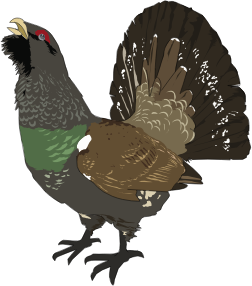Which Way Does the Wind Blow? Chapter 1
There was once a bear who livedlived in a forestforest up in the ArcticArctic Circle. He was a big bear, an old bear and a very clumsyclumsy bear. The other animalsanimals usedused to laugh at him. "Poor old bear," they would say, "he willhe'll never make a hunter.hunter. Why, he makes as much noise as a man when he lumberslumbers through the forest."
But one day, when the old bear was prowlinging about alone,alone, he caught a grouse.  Now a grouse is a cautious bird, but this one must have been deaf or asleep.asleep. The bear was very pleasedpleased and proud, and he wantedwanted all the other animalsanimals to know how cleverclever he had been. So, holdingholding the grouse carefullycarefully in his teeth withoutwithout hurting it, he beganbegan to walk up and down the forest paths.
Now a grouse is a cautious bird, but this one must have been deaf or asleep.asleep. The bear was very pleasedpleased and proud, and he wantedwanted all the other animalsanimals to know how cleverclever he had been. So, holdingholding the grouse carefullycarefully in his teeth withoutwithout hurting it, he beganbegan to walk up and down the forest paths.
|
Comprehension Clarify these words: Arctic Circle, clumsy, lumbers, prowling, grouse. Retell what has happened so far in this fable. Make inferences or give opinions about:
Predict what you think might happen next. What question could you ask about this narrative? Visualise these uses of descriptive language: a big bear, an old bear, a very clumsy bear; lumbers through the forest; prowling about alone; holding the grouse carefully in his teeth. Make a connection with this chapter. |
Word Study Verb endings: What happens when we add: s, ed or ing to: live, use, please. Other affixes: What happens when we add other prefixes and suffixes like er, ful, ly to these words: hunt, care, careful. What two words make up these compound words: alone, asleep, without. What two words are contracted here: he'll. Can you think of another word that ends in -tious like cautious?
|